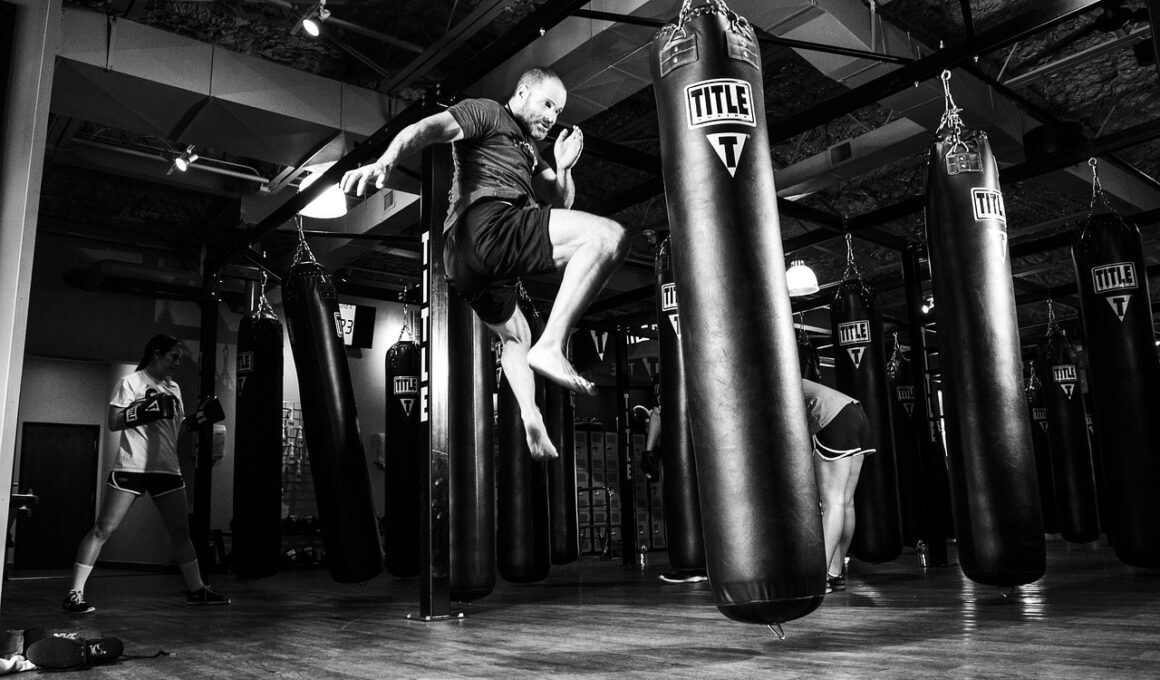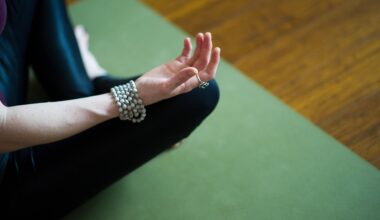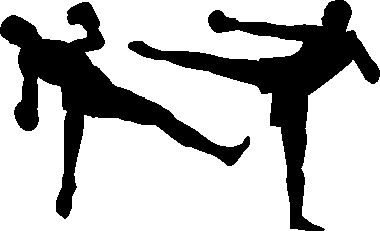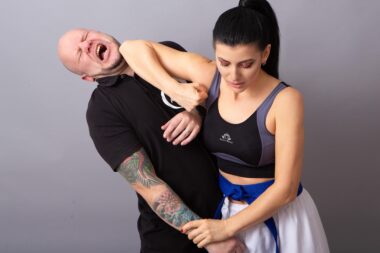The Role of Martial Arts in Improving Mental Toughness
Martial arts training serves as a powerful means of enhancing mental toughness, a valuable trait beneficial in various aspects of life. By engaging in martial arts, individuals learn discipline, focus, and resilience. These elements contribute to mental toughness by helping practitioners overcome challenges and setbacks. When a practitioner faces a demanding situation, such as sparring or executing complex techniques, they must maintain concentration to perform effectively. This focus can translate beyond the dojo, aiding their performance in everyday tasks and responsibilities. Moreover, martial arts foster an understanding of one’s own limits and weaknesses. Knowing where to improve empowers individuals to confront challenges boldly and strive for betterment. Regular practice instills confidence in their abilities, enabling personal growth. Individuals develop a mindset that encourages continuous self-improvement and learning. This can build a strong foundation for success, whether professionally, academically, or in personal relationships. Ultimately, the intersection of martial arts training and mental toughness extends its benefits beyond the training mat into daily life. By responding to both physical and mental challenges, practitioners cultivate resilience that enhances their overall quality of life.
Discipline and Focus Through Training
Discipline is an essential pillar in martial arts training, significantly contributing to mental toughness. Practitioners learn to adhere to a structured training regimen, which fosters a sense of responsibility and reliability. This self-discipline demands consistency and effort, ultimately shaping one’s character. Through unwavering dedication, students cultivate a mindset capable of overcoming adversity. Additionally, focus is crucial during martial arts training, with practitioners engaging in various techniques and sparring exercises. The immersive nature of martial arts requires unwavering attention to detail, improving one’s ability to concentrate. Focusing on techniques enables individuals to analyze their performance critically, leading to continuous improvement. As their focus sharpens, they can apply this skill in all walks of life, including academics and career pursuits. The ability to maintain concentration under pressure is cultivated through various training scenarios, such as live sparring and competitions. Over time, practitioners learn to redirect their mental energy and calm their minds, even amidst chaotic surroundings. This newfound focus can help them excel in challenging situations, making disciplined and focused martial artists better equipped to handle life’s obstacles. Thus, martial arts serve as an exceptional tool for building discipline and focus essential for mental toughness.
In martial arts, practitioners also develop resilience through a combination of physical conditioning and psychological training. The continuous process of getting knocked down and getting back up again is emblematic of martial arts. Each time participants face challenges during training, they enhance their mental fortitude and learn to cope with adversity. Resilience is not merely about physical strength; it transcends into mental and emotional domains as well. When practitioners experience setbacks – whether through defeat in sparring or failures in mastering a technique – they learn to respond positively. Instead of viewing setbacks as failures, they see them as opportunities for growth. This mindset shift is pivotal in developing mental toughness. The practice of martial arts inherently teaches individuals the importance of perseverance and determination. Overcoming obstacles – whether emotional or physical – leads to a stronger, more resilient mindset. As each hurdle is surpassed, confidence builds, reinforcing the belief that challenges can be faced head-on. Practitioners learn not to shy away from challenges but to confront them head-on, equipping them with the mental tools needed to thrive in a demanding world, both on and off the training mat.
Confidence Building Through Achievement
One significant benefit of martial arts training is the boost in confidence that comes with achievement. As practitioners progress through various ranks and master new techniques, they gain a sense of accomplishment. This recognition reinforces their self-esteem and belief in their abilities. Achieving milestones in martial arts cultivates a positive self-image, which contributes to overall mental toughness. Additionally, the confidence gained through competition further strengthens this mental resilience. Competing in tournaments helps individuals confront their fears and anxiety, forcing them to step out of their comfort zones. Engaging with opponents in competition creates valuable experiences that challenge practitioners to push their limits. Overcoming these challenges in a competitive setting further solidifies their self-confidence. As they face opponents of varying skill levels, they develop an appreciation for their own capabilities. This realization translates into everyday life, where having self-assurance fosters resilience in the face of adversity. Martial artists carry the confidence gained from their achievements into other areas of life, such as in their careers and relationships. Consequently, the confidence built through martial arts training becomes a crucial component of developing mental toughness.
Strategic thinking and decision-making skills are critical components in martial arts training that foster mental toughness. During practice sessions, martial artists learn to think critically and develop strategies to outmaneuver opponents. This mental engagement forces practitioners to analyze situations rapidly and make quick decisions. The heightened awareness cultivated through training enables individuals to assess their environment, anticipate opponents’ moves, and respond effectively. Such strategic thinking translates into real life, teaching practitioners to make informed choices in challenging situations. In everyday scenarios, individuals equipped with these skills can tackle problems with a composed and calculated approach. Furthermore, martial arts training emphasizes the importance of adaptability. Practitioners often encounter unexpected situations during training, requiring them to adjust their plans quickly. Embracing flexibility in problem-solving enhances mental toughness, enabling individuals to maintain composure even when faced with uncertainty. As they learn to adapt to changing circumstances, they develop a mindset open to change and innovation. This ability to adjust strategies effectively when obstacles arise becomes a key asset in both personal and professional growth. The mental agility gained through martial arts training ultimately contributes to well-rounded mental toughness essential for navigating life’s challenges.
Community and Support System
Another vital aspect of martial arts training is the sense of community it fosters, contributing significantly to mental toughness. Participants train together, forming bonds that create a supportive environment conducive to growth. This collective atmosphere encourages practitioners to help each other overcome challenges, fostering resilience. As members share experiences and support one another, they build camaraderie essential for mental strength. This network of encouragement provides emotional backing, especially during tough training phases or competitions. Knowing that others face similar struggles enables practitioners to persevere through difficulties. The supportive community reinforces concepts of teamwork and collaboration, both of which are instrumental in nurturing mental toughness. These shared values create a sense of belonging, which can be pivotal in helping individuals navigate stress, anxiety, and self-doubt. Furthermore, competition within this community often drives individuals to elevate their skills, pushing one another to improve continually. The motivation drawn from peers creates a healthy competitive spirit vital for mental agility and determination. The bonds formed in this environment often extend beyond the dojo, influencing various life aspects positively. Therefore, the community aspect inherent in martial arts training nurtures mental toughness essential for overcoming life’s hurdles.
Ultimately, the practice of martial arts training provides individuals with the tools necessary for cultivating mental toughness, enriching their lives. By understanding the intricate relationship between physical activity and mental resilience, practitioners can grasp how martial arts shapes character. The holistic approach combining discipline, focus, resilience, confidence, strategic thinking, community support, and adaptability all contribute to a well-rounded mental fortitude. These elements intertwine, creating a comprehensive framework that enables individuals to tackle everyday challenges effectively. As training progresses, practitioners find themselves rising above obstacles, emerging as stronger individuals ready to face life. The skills learned in the dojo carry forward, allowing individuals to approach their personal and professional lives with unwavering strength. Embracing the journey of martial arts training transforms not only physical attributes but also cultivates an unyielding spirit. In a fast-paced, often challenging world, the mental toughness developed through martial arts serves as an indispensable asset. Individuals are empowered to strategically navigate their lives, turning adversities into opportunities for growth. Thus, the role of martial arts in improving mental toughness is profound and far-reaching, enriching individuals holistically.





